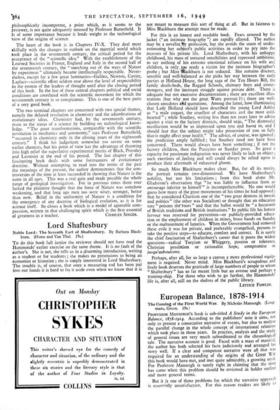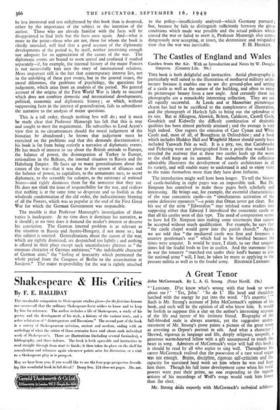European Balance, 1878-1914
The Coming of the First World War. By Nicholas Mansergh. (Long- mans, Green. 15s.) PROFESSOR MANSERGH'S book is sub-titled A Study in the European Balance, 1878-1914. According to the publishers' note it aims, not only to present a consecutive narrative of events, but also to analyse the parallel change in the whole concept of international relations which took place in those years. In practice, analysis and the study of general issues are very much subordinated to the chronological tale. The narrative account is good. Faced with a mass of material, the author has both selected his facts judiciously and arranged his story well. If a clear and competent narrative were all that was required for an understanding of the origins of the Great War this book would have met, and met quite admirably, a growing need. For Professor Mansergh is surely right in claiming that the time has come when this problem should be reviewed in bolder outline and more general terms.
But it is one of those problems for _which the narrative approach is essentially unsatisfactory. For this reason readers are likely to be less interested and less enlightened by this book than is deserved, either by the importance of the subject or the intention of the author. Those who are already familiar with the facts will be disappointed to find little but the facts once again. And—what is more to the point—those who are not, those for whom the book is chiefly intended, will find that a good account of the diplomatic developments of the period is, by itself, neither interesting enough nor adequate for an appreciation of the causes of the war. The diplomatic events are bound to seem unreal and confused if studied separately—if, for example, the internal history of the major Powers is not successfully knit into the story of international relations. More important still is the fact that contemporary interest lies, not in the unfolding of these past events, but in the general issues, the moral dilemmas, the problems of psychology, the questions for judgement, which arise from an analysis of the period. No general account of the origins of the First World War is likely to succeed which does not combine domestic and international developments, political, economic and diplomatic history ; or which, without suppressing facts in the interest of generalisation, fails to subordinate the narrative to the analysis of major questions.
This is a tall order, though nothing less will do ; and it must be made clear that Professor Mansergh has felt that this is true and sought to meet the requirement. He subscribes to Lord Acton's view that in no circumstances should the moral judgement of the historian be abandoned ; he knows that judgement must be exercised on the problems and that this demands discrimination ; his book is far from being entirely a narrative of diplomatic events. He has much of interest to say about the British attitude to Europe, the balance of power, the disintegration of Turkey in Europe, nationalism in the Balkans, the internal situation in Russia and the Habsburg Empire. He faces up to many generalisations about the causes of the war—that it was due to the system of alliances and the balance of power, to capitalism, to the armaments race, to secret diplomacy, to the scramble for colonies, to the existence of national States—and righly dismisses them for the nonsense that they are. He does not shirk the issue of responsibility for the war, and realises that nothing is at the same time so desperate and so foolish as the wholesale condemnation of the old order, the indiscriminate blaming of all the Powers, which was so popular at the end of the First Great War for which the German Government was responsible.
The trouble is that Professor Mansergh's investigation of these topics is inadequate. At no time does it dominate his narrative, as it should ; at no time does it demand the reader's interest or deserve his conviction. The German internal problem is as relevant as the situation in Russia and Austro-Hungary, if not more so ; but this subject is omitted. Generalisations about the causes of the war, which are rightly dismissed, arc despatched too lightly ; and nothing is offered in their place except such unsatisfactory phrases as " the ominous character of German ambitions," "the indefinable character of German aims," the " feeling of insecurity which permeated the whole period from the Congress of Berlin to the assassination at Sarajevo." The major responsibility for the war is rightly attached to the policy—insufficiently analysed—which Germany pursued ; but, because he fails to distinguish sufficiently between the given conditions which made war possible and the actual policies which caused the war or failed to avert it, Professor Mansergh also comes dangerously near accepting, at times, the determinist and misguided view that the war was inevitable. F. H. HINSLEY.



































 Previous page
Previous page